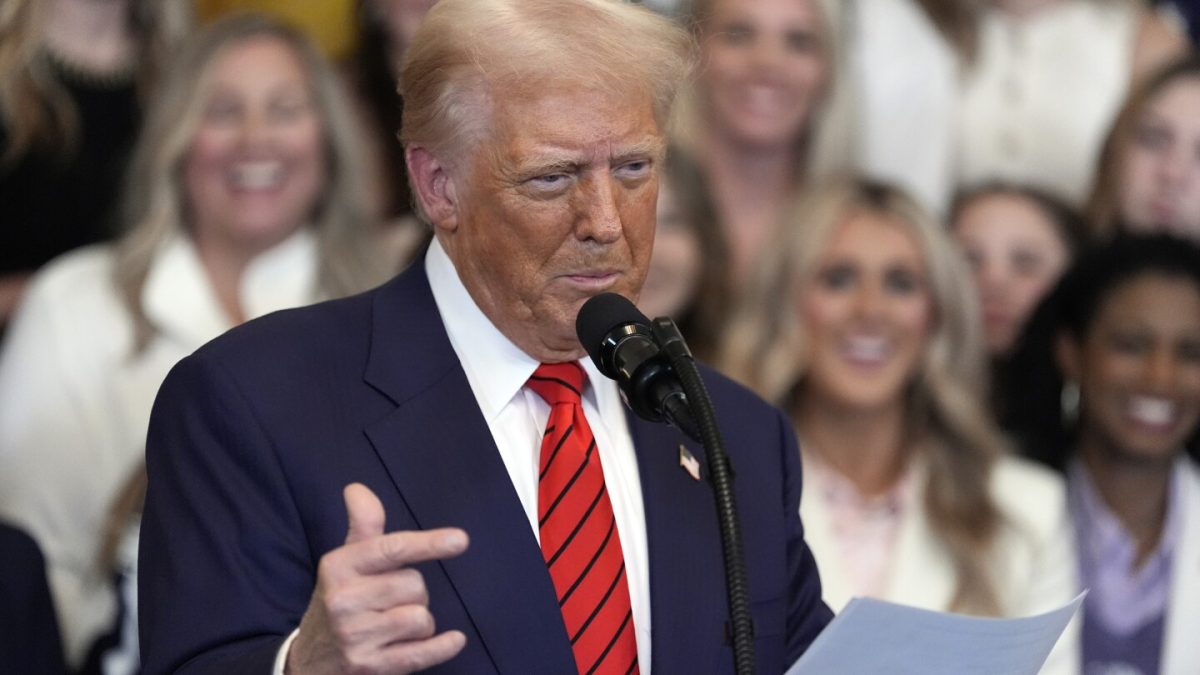President Donald Trump signed an executive order on Feb. 5 banning transgender women and girls from participating in female sports.
The order, titled “No Men in Women’s Sports,” took place on the same day as the 39th annual National Girls & Women in Sports Day, is the fourth executive order that has been issued by the president regarding transgender people since his inauguration in January. It applies to any entities that receive federal funding and are required to abide by Title IX, the law that prohibits discrimination in sports and other programs based on sex.
“With this executive order,” said Trump as he signed the order in the East Room of the White house surrounded by lawmakers and female athletes in support of the ban, “the war on women’s sports is over.”
In a statement made to reporters after the signing, White House Press Secretary Karoline Leavitt discussed the executive order, saying it would “uphold the promise of Title IX” and would require immediate enforcement action against schools and associations that deny women access to single-sex sports and single-sex locker rooms.
Title IX is a federal civil rights law that was passed in 1972 as part of the Education Amendments. It prohibits sex-based discrimination in schools and in other programs that receive federal funding. Besides protecting against sex-based discrimination for students and government employees, the law also grants women equal opportunities in sports. During former president Joe Biden’s term, a federal judge struck down an extension to Title IX that clarified the law to protect sexual orientation and identity.
Trump’s executive order gives the Education Department the authority to penalize schools that allow transgender women to compete in women’s sports categories, with any school found in violation to be ineligible for federal funding.
Additionally, the order extends to major sport associations like the National Collegiate Athletics Association, which, although does not directly receive federal funding, is still subject to Title IX because it operates federally funded athletic programs in its member institutions.
“This national standard brings much needed clarity as we modernize college sports for today’s athletes,” said NCAA President Charlie Baker. The statement was made to the press on the following day of the executive order signing as Baker announced an update to its transgender student-athlete policy, which restricts women’s sports only to women assigned female at birth and leaves the men’s sports category open to all athletes, regardless of their assigned sex at birth.
Richland student Harrison Nguyen shared his thoughts on Trump’s executive order banning transgender athletes in women’s sports.
“It’s very controversial and I think it’s a very mixed feeling because if someone is transgender, identifies themselves as female, and wants to play sports, they can’t because Trump is trying to look at their origin as their identity,” said Nguyen. “I think that it’s very, very brutal.”
Prior to the executive order, 27 states already had laws that prevented transgender athletes from participating in sports that don’t align with their assigned sex at birth. A survey of U.S. adults conducted by Gallup Inc. also found that nearly 70% of adults who chose to respond said that trans athletes should be limited to participating in sports teams that correspond to their birth sexes.
Prior to this executive order, Trump signed three executive orders stating that the government only recognizes two sexes, male and female, banning transgender people from enlisting in the military, and restricting access to gender-affirming care for trans people younger than 19. The Feb. 5 executive order is one of the latest in federal policy regarding assigned sex at birth.







